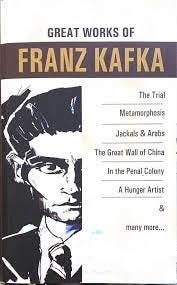Kafkaesque and the Man behind it!

Sometimes conditions do not favour you and everything goes wrong in your life. You fail to measure up to the expectations of the people. You want to live the life of choice but aren’t allowed. You are expected to fit in the norm set by others’ and your personal preferences are not valued. The things you like with every fibre of your being are unappreciated by society and your parents. There comes a time when you become an object of ridicule to everyone. Your worth and credentials are questioned. You are considered nothing more than a burden. Overall, the things around you change for bad and you find yourself in a deep dark tunnel with no end. You, however, don’t lose the game of life rather you enter into Kafka’s world — wherein enduring pain is only the way to exist even after death.
Franz Kafka is a well-known, even the greatest, German writer of the 20th century. He is enlisted among those writers who got accreditation posthumously. Writing about the most neglected part of the human spectrum that is marked with alienation, disorientation, disappointment, failures, and darkness sets Kafka apart from others. Characterized by anxiety, alienation, and depiction of absurd and unnerving situations, his writings make him unique. Fascinatingly, this has led to a whole new concept — Kafkaesque that has entered the vernacular to describe the complicated and vexatious human experiences.
Franz Kafka was what he wrote. To put it another way, he wrote what he experienced, nothing more and nothing less. Born in Prague, the capital city of the Czech Republic in 1883 to Herman Kafka and Julie Kafka, Franz Kafka was the ill-stared son who pined for parental love throughout his life. His father Herman Kafka established himself as a great businessman. His lucky stars touched the zenith and he turned out to be a successful person with an impressive personality. He married Julie Kafka with Franz Kafka as one of their children. Father and son were at cross purposes. Franz Kafka’s individuality, personality, perspectives, and ideology ran counter to his father’s. He was not what his father wanted him to be and instead of trying to understand his psyche, worldview, interests, and necessarily his talent, his father trivialized him every time. Kafka felt oppressed by him for most of his life. He began to write his rage, which gradually became a form of catharsis for him. With time his love for writing deepened. He aspired to pursue writing as his career, which again was something ludicrous to his father. Against his self-will, he studied law but didn’t let his writing passion be extinguished. Even after yielding to his parental wishes by completing legal education and subsequent time-consuming employment in insurance companies, he couldn’t derive warmth, affection, acceptance, and well-deserving encouragement. A few years before he died in 1919, Kafka wrote a 47-page letter to his father to vent out his pent-up feelings. In a letter, he mentioned the sufferings he faced at his father’s hands and minced no words in pouring out his heart. He wrote ‘What I would have needed was a little encouragement, a little friendliness, a little keeping open of my road’. With the dream of reaching out to his father and ending the prolonged communication gap, he wanted her mother to be intermediate in handing over the letter to his father. But he was unfortunate. His mother refused to do that on the pretext that such an emotional piece may disturb Herman Kafka and his work. All this, literally Kafka’s Scenario, constitutes the nucleus of Kafka’s work. Kafka never mentioned his father in any of his work. All his works are, however, emblematic of the agony he went through because of his family, particularly his father and workplace.
Amidst the gloom, Franz Kafka met Max Brod and befriended him. Max Brod, a writer, got around him to publish his work. And Kafka published his three stories including his masterpiece Metamorphosis. Much to his dismay, his work went unnoticed. Frustrated Kafka decided not to bring his writing into the public domain. In his testament, he even advised his friend to turn his writings into ashes. Max did the opposite, though. He collected, organized, and published his works like The Trail, The Castle, and Amerika, etc., and facilitated us to delve into Kafa’s world today and celebrate the great Franz Kafka who died in 1924 after living only for four decades.
Writer : Zeeshan Rasool Khan is a student, educator, blogger, and columnist. He tweets @Zeeshan_rk and can be mailed at mohdzeeshan605@gmail.com
.jpg)

Comments
Post a Comment